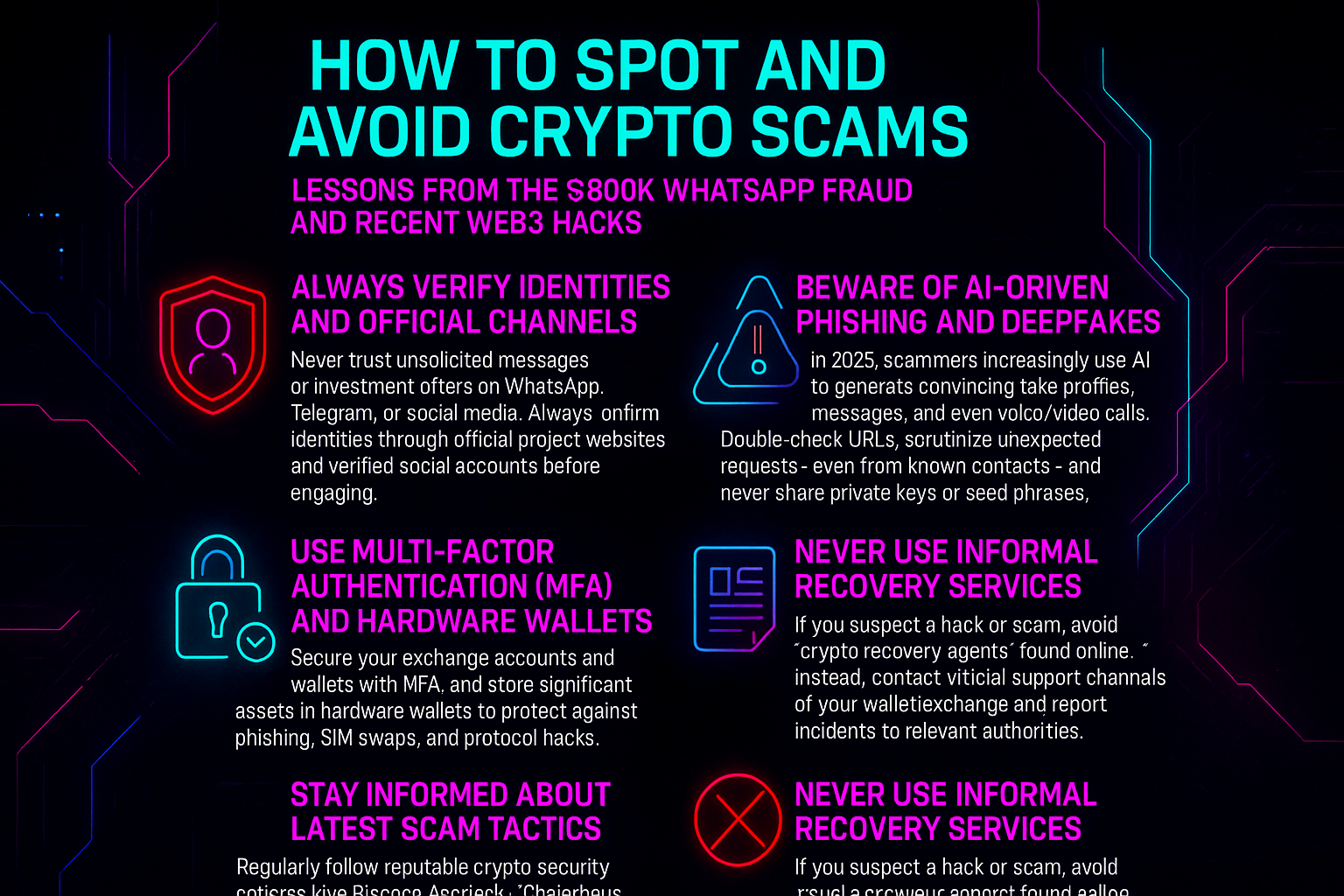Crypto scams are evolving at a staggering pace in 2025. Recent high-profile cases like the $800, 000 WhatsApp fraud and a wave of Web3 hacks have proven that even seasoned investors are not immune. With AI-driven phishing, deepfakes, and increasingly sophisticated social engineering tactics, the need for robust personal security practices has never been greater. Let’s break down the most actionable tips to help you spot and avoid the latest crypto scams, using real lessons from this year’s most devastating attacks.
![]()
WhatsApp Crypto Fraud: Why Verifying Identities Matters More Than Ever
In December 2024, nearly 800 people were arrested in Nigeria for orchestrating a massive crypto-romance scam that targeted victims through WhatsApp and other messaging platforms (source). This case is just one example of how scammers exploit trust by posing as friends, romantic interests, or investment advisors. They often use stolen photos or even deepfake videos to appear legitimate.
Actionable Tip #1: Always Verify Identities and Official Channels. Never trust unsolicited messages or offers on WhatsApp, Telegram, or social media, even if they seem to come from someone you know. Always confirm identities through official project websites and verified social accounts before engaging. If you’re unsure, step back and double-check before clicking any links or sharing information.
Securing Your Assets: MFA and Hardware Wallets Are Non-Negotiable
The surge in hacking losses, over $2. 2 billion stolen in 2024 alone (source): was largely due to compromised private keys targeting centralized platforms. Many attacks leveraged phishing techniques to steal login credentials or bypass weak security setups.
Actionable Tip #2: Use Multi-Factor Authentication (MFA) and Hardware Wallets. Always enable MFA on your exchange accounts and wallets. For significant holdings, store your assets in a hardware wallet, not online or on your phone. This greatly reduces your exposure to phishing attacks, SIM swaps, and protocol hacks targeting hot wallets.
5 Essential Tips to Avoid Crypto Scams in 2025
-

Always Verify Identities and Official Channels: Never trust unsolicited messages or investment offers on WhatsApp, Telegram, or social media. Always confirm identities through official project websites and verified social accounts before engaging. This is crucial, as recent scams have exploited fake profiles and impersonation to steal funds.
-

Use Multi-Factor Authentication (MFA) and Hardware Wallets: Secure your exchange accounts and wallets with MFA, and store significant assets in hardware wallets like Ledger or Trezor. This protects you against phishing, SIM swaps, and protocol hacks that have led to multi-million dollar losses in 2024-2025.
-

Beware of AI-Driven Phishing and Deepfakes: In 2025, scammers increasingly use AI to generate convincing fake profiles, messages, and even voice/video calls. Double-check URLs, scrutinize unexpected requests—even from known contacts—and never share private keys or seed phrases.
-

Stay Informed About Latest Scam Tactics: Regularly follow reputable crypto security sources like Binance Academy, Chainalysis alerts, or Blockchain Magazine to stay updated on new scam trends such as NFT protocol exploits or airdrop phishing.
-

Never Use Informal Recovery Services: If you suspect a hack or scam, avoid ‘crypto recovery agents’ found online. Instead, contact official support channels of your wallet or exchange and report incidents to relevant authorities for legitimate help.
The Rise of AI Scams: Don’t Be Fooled by Deepfakes and Phishing
In 2025, scammers are leveraging AI tools to create convincing fake profiles, generate realistic voice/video calls, and craft highly targeted phishing messages (source). These tactics trick even experienced users into revealing sensitive information or clicking malicious links.
Actionable Tip #3: Beware of AI-driven phishing and deepfakes. Double-check URLs before entering credentials, even if a message appears to come from someone you know. Scrutinize unexpected requests for money or sensitive info. And remember: never share your private keys or seed phrases, no matter how convincing the request seems.
Staying ahead of these AI-powered threats requires a blend of vigilance and skepticism. Even if a friend or colleague sends you an urgent message about a “can’t-miss” crypto opportunity, pause and independently confirm their identity through another channel. Scammers now use deepfake audio and video to impersonate voices, making traditional verification methods unreliable.
Stay Ahead of the Curve: Keep Informed on New Scam Tactics
With the rapid pace of innovation in Web3, new scam tactics appear almost monthly. In May 2025 alone, code vulnerabilities accounted for $229. 6 million in losses, a staggering 4, 483% increase from the previous month (source). NFT protocol exploits and airdrop phishing are just two examples of the latest attack vectors targeting both newcomers and seasoned investors.
Actionable Tip #4: Stay informed about new scams. Make it a habit to follow trustworthy crypto security sources such as Binance Academy, Chainalysis alerts, or Blockchain Magazine. These platforms offer timely updates on emerging threats and real-world case studies on how scams unfold. By keeping yourself updated, you’ll be better equipped to spot red flags before they become costly mistakes.
When Things Go Wrong: Why You Should Never Use Informal Recovery Services
The aftermath of a scam can be disorienting and emotional, scammers know this and prey on victims with promises of fast recovery for a fee. So-called “crypto recovery agents” found online are almost always another layer of fraud, often extracting more money or personal information from their targets (source).
Actionable Tip #5: Never use informal recovery services. If you believe your funds have been stolen or your account compromised, always contact the official support channels for your wallet or exchange. Report incidents to relevant authorities, this is the only legitimate path toward possible remediation or investigation. Engaging with unverified recovery services will only deepen your losses.
Your Crypto Safety Checklist for 2025
The surge in sophisticated scams, from WhatsApp romance frauds to AI-powered phishing, makes crypto onboarding safety more important than ever. By consistently applying these five strategies, verifying identities, securing accounts with MFA and hardware wallets, staying alert to AI threats, keeping informed about new scam tactics, and avoiding informal recovery services, you significantly reduce your risk profile in today’s digital asset landscape.
If you’re ever in doubt, remember that pausing to double-check is always safer than reacting quickly under pressure. The evolving world of Web3 offers tremendous opportunity, but only if you protect yourself with knowledge and caution at every step.



